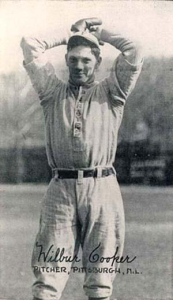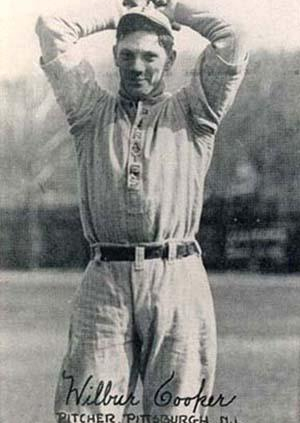Wilbur Cooper
 Even though his 13 years in the Steel City fell between the World Championship seasons of 1909 and 1925, Wilbur Cooper was arguably the greatest pitcher in Pittsburgh Pirates history. Cooper holds the franchise single-season record for ERA (1.87 in 1916) and the all-time records for victories (202) and complete games (263). An exceptional control pitcher who allowed only 2.2 walks per nine innings over the course of his 15-year career, Cooper was slim in stature and threw his repertoire of a fastball, curve, and change-up with a fluid delivery, causing many to mistake his stylish manner for an indifferent attitude. “Nothing could be farther from the truth,” wrote one reporter. “The Pirate southpaw works as hard as any other hurler, but his grace and ease of motion misleads some of the rooters.”
Even though his 13 years in the Steel City fell between the World Championship seasons of 1909 and 1925, Wilbur Cooper was arguably the greatest pitcher in Pittsburgh Pirates history. Cooper holds the franchise single-season record for ERA (1.87 in 1916) and the all-time records for victories (202) and complete games (263). An exceptional control pitcher who allowed only 2.2 walks per nine innings over the course of his 15-year career, Cooper was slim in stature and threw his repertoire of a fastball, curve, and change-up with a fluid delivery, causing many to mistake his stylish manner for an indifferent attitude. “Nothing could be farther from the truth,” wrote one reporter. “The Pirate southpaw works as hard as any other hurler, but his grace and ease of motion misleads some of the rooters.”
The fifth oldest of seven children (all boys, one of whom died in infancy) of Maggie (Lough) and Jesse Cooper, Arley Wilbur Cooper was born in Bearsville, West Virginia, on February 24, 1892, 18 years to the day after the birth of his future teammate Honus Wagner. In Wilbur’s youth the Cooper family moved north to Waterford, Ohio, where Jesse established a farm and worked as a schoolteacher. During his childhood Wilbur attended school and helped out on the farm, but it wasn’t long before his strong left arm steered him toward a different line of work. The 19-year-old pitcher made his debut in professional baseball in the Ohio State League in 1911 with the Marion club that was owned by newspaper publisher and future US President Warren Harding. Legend has it that Harding was the person who recommended Wilbur to the Pirates, but the young southpaw made a stop between Marion and the majors, pitching for Columbus of the American Association at the tail end of 1911 and for most of 1912.
Following a 16-9 year at Columbus in 1912, Cooper received a late-season trial with Pittsburgh, blanking the St. Louis Cardinals, 8-0, in his major-league debut on September 6. That performance was made all the more memorable by Honus Wagner’s stellar defensive play. At the end of one inning, the rookie remarked, “Mr. Wagner, if you field like that behind me, I’ll stay up here a long time.” Cooper wasn’t always so gracious. An intense competitor, he often became visibly upset when teammates made errors behind him, which may have been another reason (along with his youth) that observers called him the Pirates’ “Baby Pitcher.” In any event, Cooper was nothing short of sensational in his six-game tryout, running his record to 3-0 with two shutouts and a 1.66 ERA.
On a team that was rapidly sinking in the standings, Cooper’s development into a mature pitcher offered a glimmer of hope for the future. Pitching mostly out of the bullpen in 1913, he showed enough promise to warrant an offer of a two-year contract at $5,000 per season from the Federal League. Cooper turned down the Feds and turned up his performance, emerging in 1914 as the ace of the Pirates by winning 16 games and posting a 2.13 ERA in 266⅔ innings. After an inexplicably dreadful 1915 campaign in which he went 5-16 with an ERA nearly higher than the NL average, Wilbur bounced back the following year to post a career-best 1.87 ERA. Pitching for a sixth-place club in a nearly deserted Forbes Field, he received only enough offense from his teammates to compile 12 wins, while the Pirates were shutout in seven of his 11 losses. Cooper confidently referred to himself as a “star player,” and his top salary of $12,500 reflected his value to the club.
As Cooper developed, he increasingly relied on pinpoint control: from 1917 to 1924 he finished in the NL’s Top 10 five times in fewest walks per nine innings. A fast worker, he was often in mid-windup when he received the signal from Walter Schmidt, his catcher for eight years. When Wilbur and fellow quick-pitcher Pete Alexander once hooked up for a game in Forbes Field, the contest was over in 59 minutes. As the Pirates slowly built themselves back into contenders, they leaned heavily on Cooper to consume innings and protect their otherwise-mediocre staff. From 1918 to 1922 he finished no worse than third in the NL in innings pitched every season, leading the league in 1921. During that span he led the NL in complete games twice while finishing in the Top Five in ERA three times. In three of those five seasons Cooper was a 20-game winner, and in the other two he finished with 19 victories. In 1919 the New York Giants offered $75,000 for him; the Pirates turned them down.
Cooper reached the 20-victory mark for the fourth and final time in 1924, leading the NL with four shutouts and helping the Pirates to a 90-63 record, just three games off the pace, the closest the club had come to a pennant in more than a decade. Pittsburgh won the World Series the next season, but the man who helped bridge the rebuilding gap for the franchise wasn’t there to see it happen. On October 27, 1924, the Pirates traded Cooper, Rabbit Maranville, and Charley Grimm to the Chicago Cubs for Vic Aldridge, George Grantham, and Al Niehaus. It was one of the blockbuster deals of the 1920s, and it was a devastating blow for the 32-year-old Cooper. “I do not want to see again in baseball a spectacle like that of the lonely, homesick Cooper trying to pitch a game against his longtime teammates at Wrigley Field in Chicago,” wrote longtime Pittsburgh baseball reporter Charles Doyle in 1925.
While the Pirates were winning their first pennant in 16 years, the Cubs fell to last place and Cooper fell with them, winning only 12 games and raising his ERA a full run to 4.28. After he got off to a similarly mediocre start in 1926, the Cubs sold him to Detroit for the waiver price in June. In 14 innings with the Tigers, Cooper managed to lose four games and post an 11.20 ERA before drawing his release. Though his major-league career was over, he continued to pitch in the minors through 1930 with Toledo of the American Association, Oakland of the Pacific Coast League, and Shreveport and San Antonio of the Texas League. Later Cooper managed McKeesport, Greensburg and Jeannette in the Pennsylvania State Association before retiring from baseball for good.
Married with three daughters, Wilbur Cooper spent his later years supporting youth baseball and working in real estate in the Pittsburgh area before moving to Southern California in 1947. In his lifetime he was named as the left-handed pitcher on the Pittsburgh Press All-Time Pirates Team in 1934, elected to the City of Pittsburgh Sports Hall of Fame in 1959, and recognized as a Sports Great in 1963 by the West Virginia Centennial Commission. In 1969 Cooper was voted the greatest pitcher in Pirates history in a Pittsburgh poll conducted to commemorate the 100-year anniversary of professional baseball.
Despite a lifetime record of 216-178 and a 2.89 ERA, Cooper drew little support for induction into the National Baseball Hall of Fame, receiving no more than 11 votes from the baseball writers during his period of eligibility. He remains one of only two pitchers with more than 3,000 innings and an ERA under 3.00 who are not enshrined at Cooperstown. In one of his last letters he wrote: “I would die a happy man if they voted me into the Hall of Fame. But, if they don’t, I will understand.” Cooper died in Encino, California, on August 7, 1973, after suffering a heart attack.
Note: A slightly different version of this biography appeared in Tom Simon, ed., Deadball Stars of the National League (Washington, D.C.: Brassey’s, Inc., 2004).
Sources
In preparing this biography, the author made use of Cooper’s Baseball Hall of Fame Library file, including multiple clippings from Pittsburgh newspapers; The Eagle; The Sporting News; Baseball Magazine; and the Biographical Dictionary of American Sports by David Porter.
Full Name
Arley Wilbur Cooper
Born
February 24, 1892 at Bearsville, WV (USA)
Died
August 7, 1973 at Encino, CA (USA)
If you can help us improve this player’s biography, contact us.


